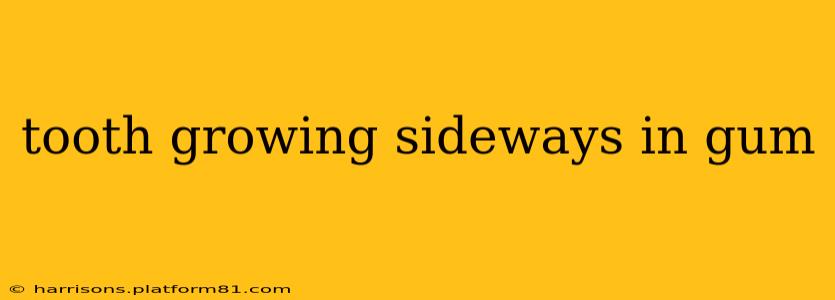Discovering a tooth growing sideways in your gum can be alarming. This condition, known as an impacted tooth, occurs when a tooth fails to erupt correctly through the gums. While it might seem like a minor inconvenience, impacted teeth can lead to various oral health problems if left untreated. This comprehensive guide explores the causes, symptoms, diagnosis, and treatment options for impacted teeth, answering many frequently asked questions surrounding this dental issue.
What Causes a Tooth to Grow Sideways?
Several factors can contribute to a tooth growing sideways in the gum. These include:
-
Lack of Space: This is the most common cause. If there isn't enough room in the jaw for the tooth to erupt properly, it may become impacted. This often happens with wisdom teeth, as the jaw often doesn't have sufficient space to accommodate their arrival.
-
Misaligned Teeth: Crowded or misaligned teeth can obstruct the path of an erupting tooth, preventing it from breaking through the gum line correctly.
-
Extra Teeth: The presence of extra teeth (supernumerary teeth) can also block the eruption of other teeth, causing them to become impacted.
-
Cysts or Tumors: In rare cases, cysts or tumors can interfere with tooth eruption and cause impaction.
-
Genetic Factors: A family history of impacted teeth may increase your risk.
What are the Symptoms of an Impacted Tooth?
Symptoms of an impacted tooth can vary depending on the severity and location of the impaction. Some common signs include:
-
Swelling or pain in the gums: This is often the first noticeable symptom.
-
Difficulty opening your mouth: An impacted tooth might restrict jaw movement.
-
Tenderness to touch: The area around the impacted tooth might be sensitive to pressure.
-
Redness or inflammation: The gums around the impacted tooth may appear red and inflamed.
-
Bad breath: An impacted tooth can contribute to bad breath if food particles become trapped around it.
How is an Impacted Tooth Diagnosed?
A dentist will typically diagnose an impacted tooth through a visual examination and X-rays. X-rays provide a clear picture of the tooth's position and surrounding structures, confirming the impaction and identifying any associated issues like cysts or tumors. Panoramic X-rays offer a comprehensive view of the entire jaw and are frequently used for diagnosing impacted wisdom teeth.
What are the Treatment Options for an Impacted Tooth?
Treatment for an impacted tooth depends on several factors, including the severity of the impaction, the tooth's position, and the patient's overall oral health. Options include:
-
Monitoring: In some cases, where the tooth is not causing any problems, the dentist might recommend simply monitoring the tooth’s progress over time.
-
Surgical Removal: This is the most common treatment for impacted teeth, particularly wisdom teeth. The procedure involves removing the impacted tooth, often with a local anesthetic.
-
Orthodontic Treatment: In some instances, orthodontic treatment (braces) might be used to create space for the impacted tooth to erupt properly.
Can an Impacted Tooth Cause Infection?
Yes, an impacted tooth can significantly increase the risk of infection. Food particles and bacteria can become trapped around the impacted tooth, leading to pericoronitis (inflammation of the gum tissue surrounding a partially erupted tooth) or a more serious infection.
Does an Impacted Tooth Always Need to Be Removed?
No, not all impacted teeth require removal. If the impacted tooth is asymptomatic (not causing any problems) and its removal poses a significant risk, the dentist might opt for monitoring instead of removal.
What Happens if an Impacted Tooth is Left Untreated?
Leaving an impacted tooth untreated can lead to several complications, including:
-
Infection: As mentioned earlier, infection is a significant risk.
-
Cyst formation: An impacted tooth can sometimes lead to the development of a cyst around its crown.
-
Damage to adjacent teeth: The impacted tooth may damage the roots or crowns of nearby teeth.
-
Jawbone damage: In some cases, an impacted tooth can damage the surrounding jawbone.
How Can I Prevent Impacted Teeth?
While you can't completely prevent impacted teeth, maintaining good oral hygiene and regular dental checkups can help identify potential issues early. Early detection and intervention can sometimes prevent more extensive treatments down the line.
This information is for general knowledge and does not constitute medical advice. Always consult with a qualified dentist for diagnosis and treatment of impacted teeth. Early intervention is key to minimizing potential complications and ensuring optimal oral health.
